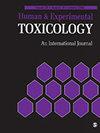Glyoxal toxicity in isolated rat liver mitochondria.
Abstract
Glyoxal is a physiological metabolite formed by lipid peroxidation, ascorbate autoxidation, oxidative degradation of glucose, and degradation of glycated proteins. Glyoxal has been linked to oxidative stress and can cause a number of cellular damages, including covalent modification of amino and thiol groups of proteins to form advanced glycation end products. However, the mechanism of glyoxal toxicity has not been fully understood. In this study, we have focused on glyoxal toxicity in isolated rat liver mitochondria. Isolated mitochondria (0.5 mg protein per milliliter) were prepared from the Wistar rat liver using differential centrifugation and incubated with various concentrations of glyoxal (1, 2.5, 5, 7.5, and 10 mM) for 30 min. The activity of mitochondrial complex II was determined by measurement of MTT (3-(4,5-dimethylthiazol-2-yl)-2,5-diphenyltetrazolium bromide) conversion. The mitochondrial membrane potential (MMP), lipid peroxidation (MDA), reactive oxygen species (ROS) formation, glutathione (GSH) content, and protein carbonylation were also assessed. After an incubation of isolated liver mitochondria with glyoxal, disrupted electron transport chain, increased mitochondrial ROS formation, lipid peroxidation, mitochondrial membrane damage, GSH oxidation, and protein carbonylation ensued as compared to the control group ( p < 0.05). Glyoxal toxicity in isolated rat liver mitochondria was dose-dependent. In conclusion, glyoxal impaired the electron transport chain, which is the cause of increased ROS and MDA production, depletion of GSH, and disruption of MMP. Mitotoxicity of glyoxal might be related to the pathomechanisms involved in diabetes and its complications.





